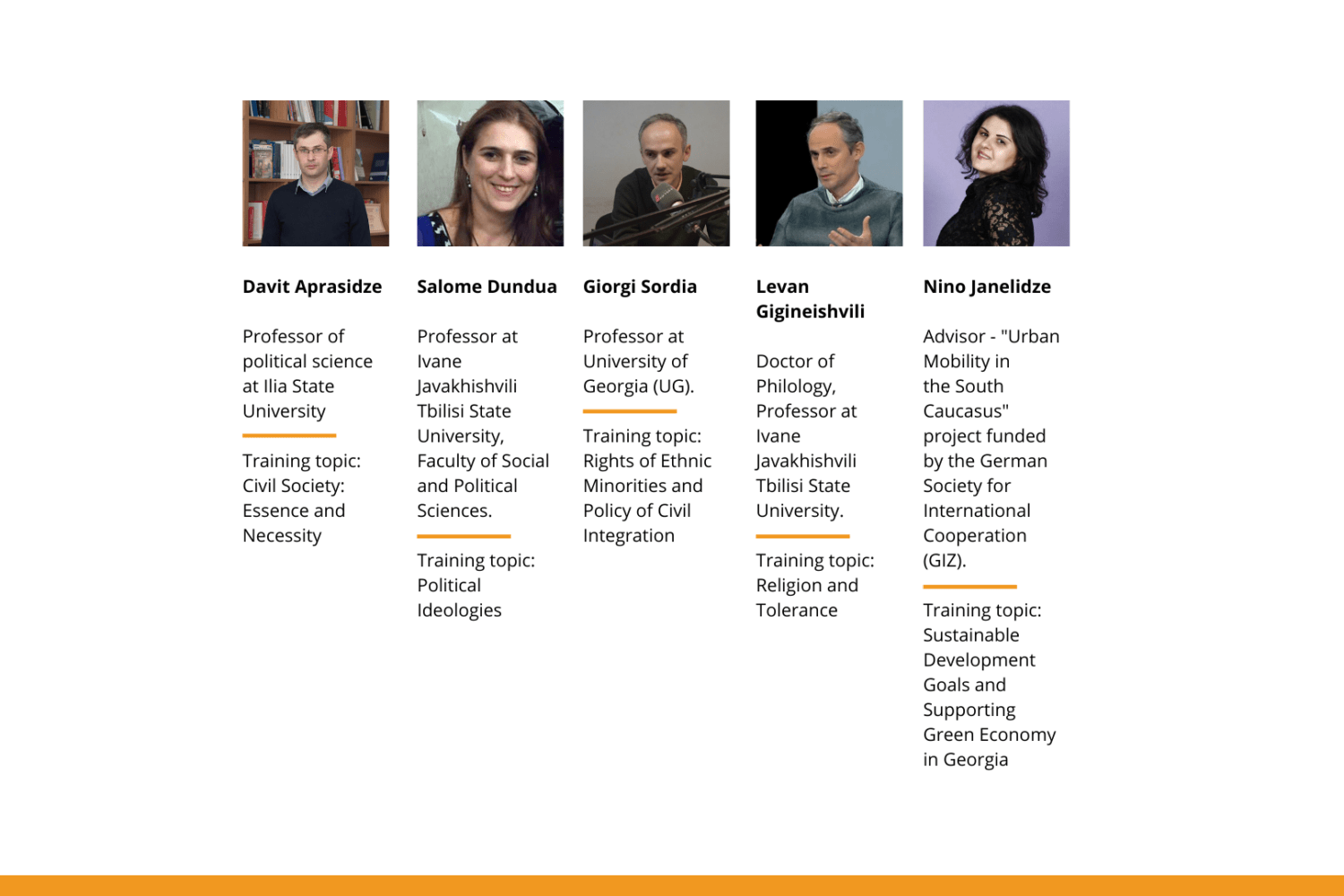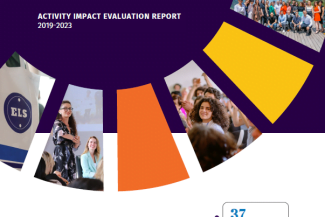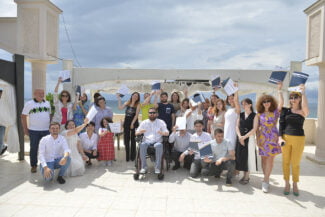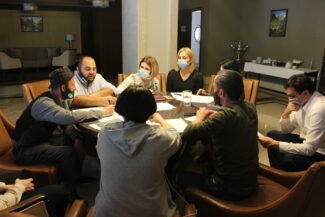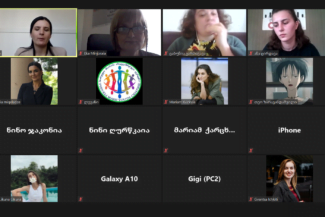GIP asked several trainers of the Emerging Leaders School (ELS) to assess the general importance of youth engagement in the social and political processes of the country and highlight challenges that exist in Georgia in these regards. They were also asked to share their impressions on the “Emerging Leaders School (ELS)”, its program, and the participants. Here is the interview with David Aprasidze, Salome Dundua, Giorgi Sordia, Levan Gigineishvili, and Nino Janelidze.
– How would you assess the engagement of young people in the social and political processes of Georgia? How important is that process?
– David Aprasidze – Engagement is sporadic and mostly expressed through protests. A more systemic and organized involvement of the youth is very important.
– Salome Dundua – Engagement of young people in the social and political processes of the country is immensely important as they are the ones who should improve the political system, which we live in and which we all strive to change for better.
– Giorgi Sordia – Engagement of young people in the social and political processes of the country is very important. Some of the young people are already actively involved in these processes and the level of their social mobilization is high. However, the situation is not the same across the country. In the regions, especially in municipalities and villages mostly populated by ethnic minorities, the level of engagement is relatively low.
– Levan Gigineishvili – It is hard to say. Politics is a wide notion. I think that the youth engagement is essential as young people should be aware of political processes and global political events; they should know about the existing political ideologies and where and how they are represented; what is left, right, welfare state, libertarianism; which model is more compatible for Georgia and Georgian mentality and to what extent; how favorable is the political course of the government, passed laws, platforms/programs of different opposition parties and their critique so that young people can make informed decisions in the elections. Also, as usual, politically informed or simply humanly emotional and reflective young people have strong emotions and feel anxious if there are some kind of fundamental degradation of human rights or national aspirations caused by the government and in that case, those young people fearlessly fight against injustice.
– Nino Janelidze – First and foremost, youth engagement in social and political processes is an essential precondition for the development of the country and a major force behind it. Both formal and informal participation of young people in the political decision-making processes is extremely important for building strong and sustainable democracy and preserving its values.
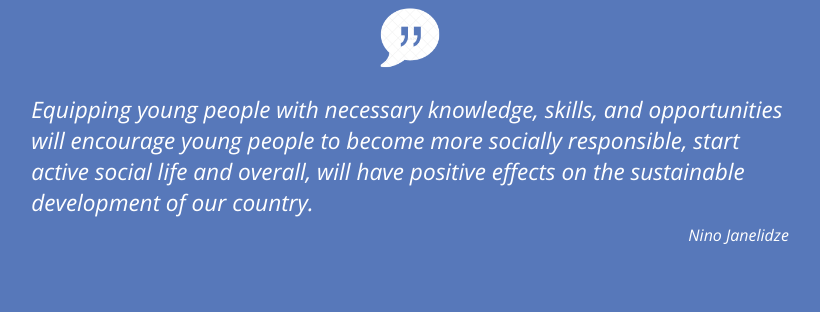
– What do you think are the major challenges to the active youth participation in social and political processes, their leadership, and to the strengthening of their social/civic activism?
– David Aprasidze – Political parties use young people as “assisting force” and they do not offer career opportunities. Also, young people do not have access to resources.
– Salome Dundua – I think that the main challenge is a lack of quality education and, general disappointment and the attitude of “I cannot change anything anyways”.
– Giorgi Sordia – one of the most serious challenges is a limited political spectrum and, in general, the lack of political culture in the country, which affects the prospects of youth involvement in the politics rather negatively.
– Levan Gigineishvili – I have not though about the challenges. Young people might not be willing to get involved in politics and that is understandable: some of them want to study and get a profession; some want to pursue PhD and postdoctoral studies and have scientific career so they do not have time for politics; some want to make money and ensure financial stability in the future; for some the thoughts of romantic love is the main “challenge” in life and they look for a partner, so they do not have time for politics either; some want to marry, even without much romance but with the desire to have kids and a stable family life as for them that is the main purpose; some are carried away by a subculture and become hippies or part of the nightlife culture; some like mystique and religion and they think politics is not interesting – all that is understandable as it is very humane and represents creative power of youth but is not confined to that. On the contrary, if a young person cannot relate to any of that and is keen on politics instead, he/she might be misunderstood and seen as a political careerist. Probably an important challenge for young people is to be actively involved in the political processes without careerism, to be active and “cool” at the same time, and not to become a careerist follower of some political agendas as politics is related to power and if a young person is drawn to the political power, that is slightly difficult for me to understand.
– Nino Janelidze – Lack of opportunities, lack of competence as well as desire, which for the most part is caused by a lack of information.
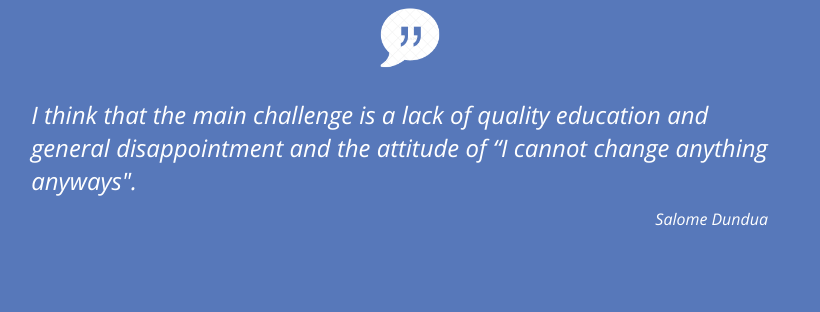
– What do you think is necessary for enhancing youth participation in democratic processes in Georgia?
– David Aprasidze – Young people should be supported in terms of education and access to the resources. Also, there should be more opportunities for youth organizations and initiatives to get support.
– Salome Dundua – I think, it is of utmost importance to improve the knowledge of young people regarding the issues of civic education.
– Giorgi Sordia – Political parties need to become stronger and realize that the involvement of every segment of the society in political life is immensely important. Accordingly, parties need to set strategies and action plans to attract different segments of the society, including the youth.
– Levan Gigineishvili – Young people should read and think a lot, become more hardworking, learn how to express their opinions effectively and think critically, strengthen morally. If there will be a lot of young people like that, it will affect the politics positively as those young people will not turn a blind eye to injustices in politics as well as in other aspects of social life.
– Nino Janelidze – First and foremost, young people should be provided with the relevant information regarding their rights and responsibilities. The next step should be raising their awareness and qualification through different trainings and campaigns. An Informed and educated citizen equals a responsible citizen!
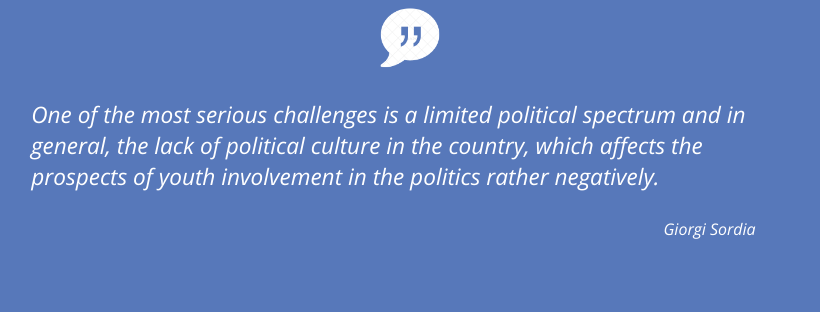
– In general, how would you assess the Emerging Leaders School (ELS)? Please, share your impressions on the trainings, participants, and other
– David Aprasidze – It is great that the participants have different professional backgrounds, which helps them to create social networks across various groups.
– Salome Dundua – I think that all four groups were very well prepared, motivated, and interested as their presentations were well thought through and interesting. Therefore, I think that the training has reached its objectives.
– Giorgi Sordia – The training was well-planned and professional backgrounds of the participants were very diverse, including the representatives of local government, civil society, students, activists, etc. I think it is important for the project to cover all the regions in the future.
– Levan Gigineishvili – Meetings in Batumi and Zugdidi were very interesting for me. I communicated with the participants, answered some questions, exchanged opinions with them, met a lot of interesting people and learned some new things. I am grateful for that opportunity.
– Nino Janelidze – I think that ELS activities, which aim to increase the involvement of young people in the social and political processes of the country, raise their awareness, and give them the opportunity to develop necessary skills, are immensely important for the fair and democratic development of Georgia. Equipping young people with necessary knowledge, skills, and opportunities will encourage young people to become more socially responsible, start active social life and overall, will have positive effects on the sustainable development of our country.
Georgian Institute of Politics (GIP) is implementing the initiative “Emerging Leaders School” (ELS) within the framework of the project “Promoting Youth Transformational Leaders in Georgia” with the financial support of USAID/Georgia and in partnership with CRRC Georgia. The project aims at raising youth awareness on political processes and democratization as well as developing their leadership skills and enhancing their participation and representation in public life.


